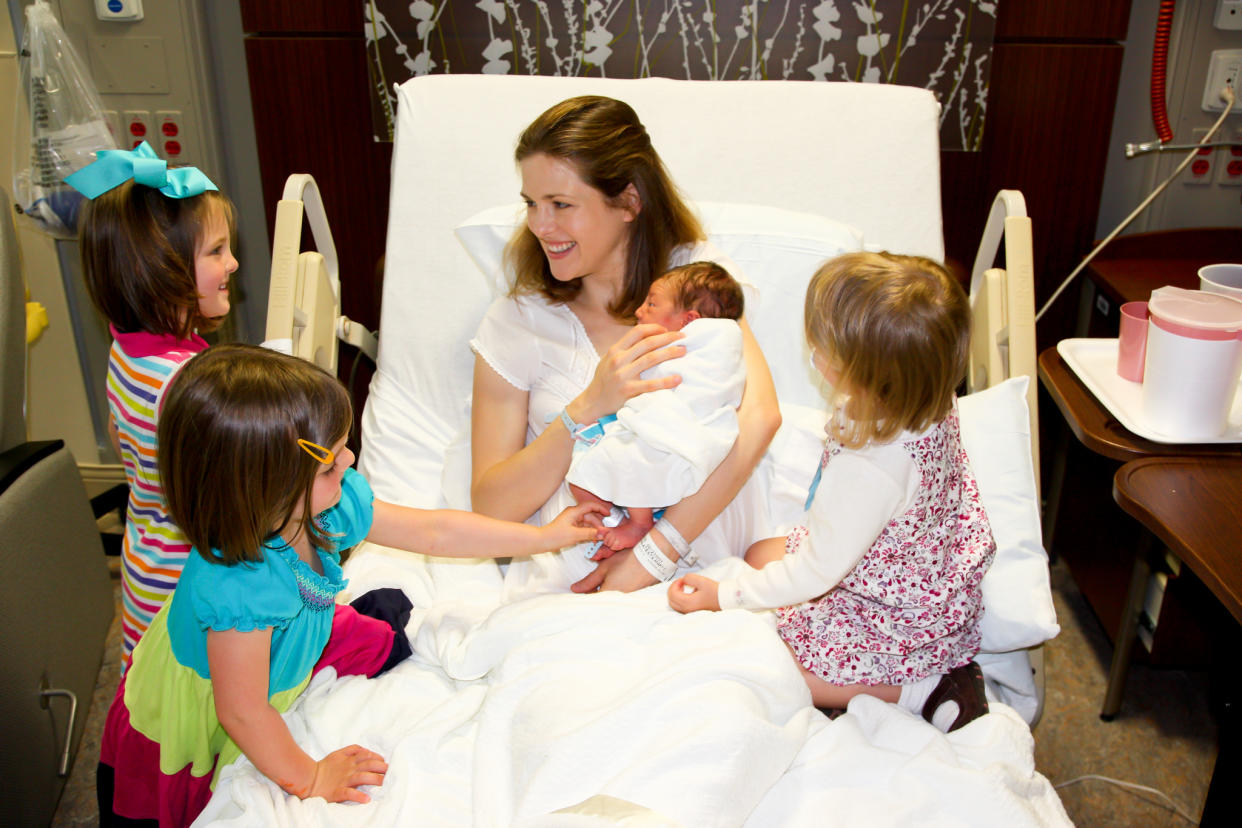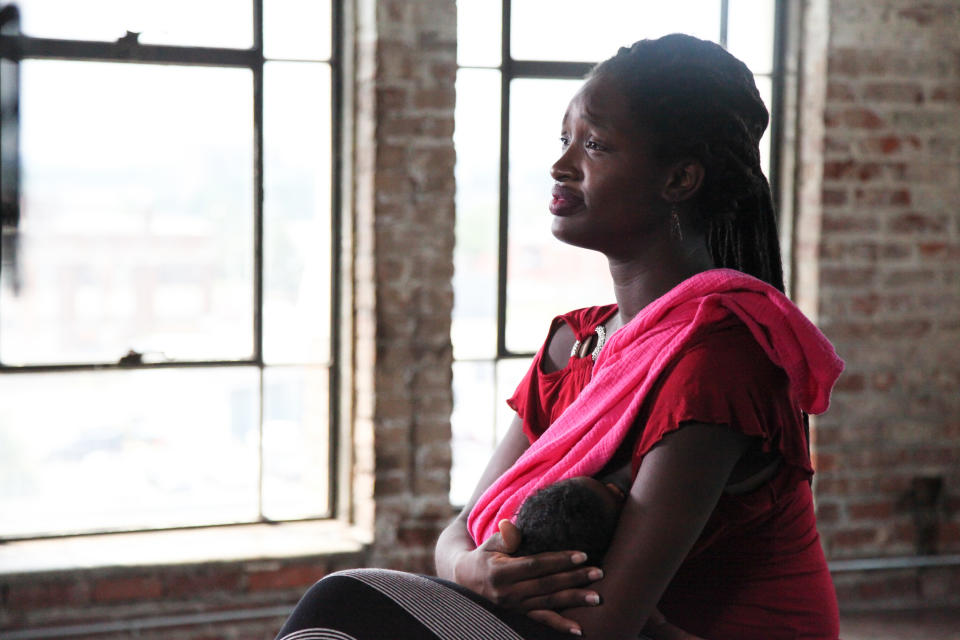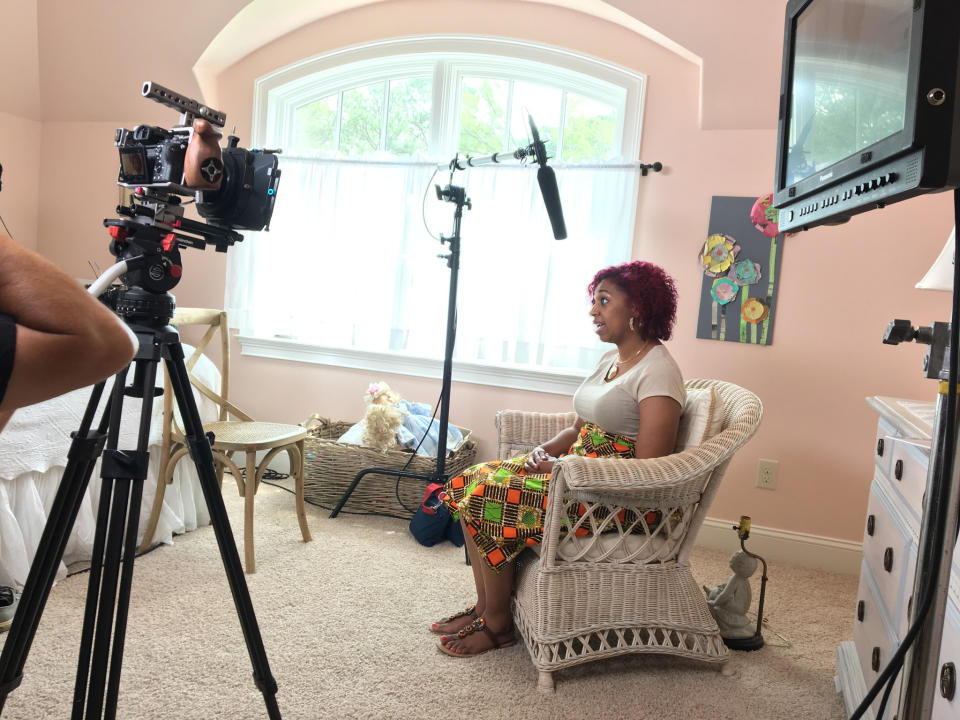How #MeToo is helping women understand their rights around giving birth

Caroline Malatesta is known to many as the mom who sued her Alabama hospital for a traumatic birth experience and won — a stunning $16 million — in a victory for laboring mothers everywhere. But instead of quietly fading back into daily life, she’s telling and retelling her chilling story, this time as part of a new fundraising effort to get a documentary film made on a vital topic: obstetric violence.
“I was telling the nurses to stop, and they would not stop. That’s not a mistake,” says Malatesta in a video clip on the new Kickstarter campaign for Mother, May I?, which has raised more than $53,000 in just two weeks.
After the birth of her youngest child, the mom of four was left with a debilitating vaginal-nerve injury, zero chance of a sex life, and lingering post-traumatic stress disorder. Those are the results of getting hit with a barrage of unwanted medical interventions and being restrained on her back during labor by medical staff who held her son’s crowning head inside her for six hellish minutes while waiting for a doctor to arrive.
“Overnight, I went from being a normal and active mother to completely debilitated, and in the bed 24/7,” she said. Her 2016 win against the Brookwood Baptist Medical Center found the hospital guilty of charges including violations of the standard of care for both labor and delivery nurses and for the marketing of health care services (the hospital had advertised its natural, “personalized” births, which attracted Malatesta).

Now, in an effort to get the word out about birth trauma and obstetric violence — which refers to aggressive treatment without consent and may entail anything from being verbally bullied during labor to being forced or coerced into cervical checks, cesarean sections, episiotomies, and more — Malatesta created and funded a non-profit, the Birth Monopoly Foundation, in honor of Cristen Pascucci’s advocacy during her trial. This will enable Pascucci, founder of Birth Monopoly and a longtime birthing-rights advocate and activist, to continue her work fighting for women. Malatesta said, “It’s important to me that others have the access to justice that I had and supporting Cristen’s work was the best way I could do that. This film — and Cristen’s work — elevates the voices of women who would not otherwise be heard.” Pascucci will be executive producer of the film.
“I thought this would be the best way to reach the largest group of people,” Pascucci tells Yahoo Lifestyle of her decision to make a film after heading up various other projects, from a photo-documentary series to advocacy work on behalf of women suing their doctors — including those who fought back over cajoled C-sections and forced episiotomies. “Our goal is for lots of women to see this and to feel validated and heard.”
The topic of stopping obstetric violence has taken on fresh importance in this #MeToo era, Pascucci adds, because just like sexual harassment and abuse, “it’s been this silenced thing among so many people — something that happens so often and is talked about so little. It’s the same framework.”

Further, she says, the trauma is similar. “It could take years for someone to actually be able to talk about her story. … This is about consent and ownership around women’s bodies, so there’s a clear parallel for me.” With obstetric violence, there is a steep learning curve; to a woman who has been raped, she notes, “We understand that you shouldn’t say, ‘Why didn’t you fight harder?’” which we may not quite get when it comes to a woman who has been violated during her labor process. “We need to ask: What is consent? What is meaningful consent? Is it a lack of no, or an empowered choice?”
In addition to helping women feel less alone with their stories, explains Pascucci, the film project includes an education and advocacy piece; she’s currently working with an obstetrician trained in sexual assault response, who is creating a trauma-informed care curriculum for birth providers.
“We are proposing that every doctor, nurse, and hospital midwife working with birthing people must be trained in consensual, minimally invasive care in order to have a license to practice,” she says, adding that she’ll be educating the public as part of the campaign around the film by giving away “Know Your Rights” classes to donors, hosting free webinars about obstetric violence and legal rights in birth, and publishing articles outlining what hospitals and doctors have been claiming in recent litigation about their rights in women’s birth processes.

Malatesta, on the Kickstarter campaign site, explains why she has continued to be active around this issue. “Those of us who have suffered birth trauma know that even when we are silenced, that nagging feeling doesn’t go away,” she writes. “Deep in our guts, we know what happened to us was wrong. When you are told ‘All that matters is a healthy baby’ or ‘Birth is unpredictable, so you must be flexible,’ remind yourself that you love your child more than anyone else in the world. You aren’t speaking up because you are ungrateful; you are speaking up because you care about your baby. When a mother’s emotional health suffers, her baby suffers, too. In the course of this campaign, we will be calling on you to tell your story and use the simple power of your voice to help us stop this abuse.”
Other women share their own harrowing tales in the film’s trailer, shot in Birmingham, Ala., including those who were subjected to gratuitous and vociferously unwanted vaginal exams, Pitocin drips, C-sections, and other interventions.
“I’ve experienced a rape before, so I went into panic and a complete shock,” one woman says. Another tearily reports about her doctor, “He told me if my baby was born dopey, they’d just give her a shot of Narcan, and that floored me.”
A husband also shares his story with the camera, “He said, ‘Your wife is having a C-section, and that’s it.’ He wouldn’t give us a medical reason.”

Even the Kickstarter comments section has become a support group, prompting those who have donated to share their own experiences:
“We gave…So that one day birth trauma and violence isn’t an epidemic anymore. So that one day every single patient in labor is treated like a human being. … So that one day no one is assaulted and violated during their childbirth, like myself, my husband and countless others.”
“For [forced episiotomy survivor] Kimberly Turbin, and for the countless other women who that has happened to, because the video of her birth absolutely broke me. Shattered me. Made me completely certain that I will be part of the solution.”
“As a human who got cut twelve times in the perineum, this film will bring out the reality of what happen to birthing people like me, thanks I’d like to thank you for making this film.”
“I am a birth doula… I am also an obstetric violence survivor and that perspective leaves me in tears of relief that a film like this is finally being made. I have healed so much in the past 6 years since my traumatic cesarean, but I know there is still so much disbelief that I was treated in such an awful manner, that it’s possible to do everything right and still have a provider behave deplorably without repercussions. This is the film that validates that. No parent, no matter who they are, deserves to be treated poorly while giving birth to their baby. Those scars last a lifetime.”
Read more from Yahoo Lifestyle:
Illegal midwives and border babies: The determined fight for home birth in Alabama
March for Our Lives and gay activism: ‘They’re definitely linked for me,’ says Emma Gonzalez
Follow us on Instagram, Facebook, and Twitter for nonstop inspiration delivered fresh to your feed, every day.

